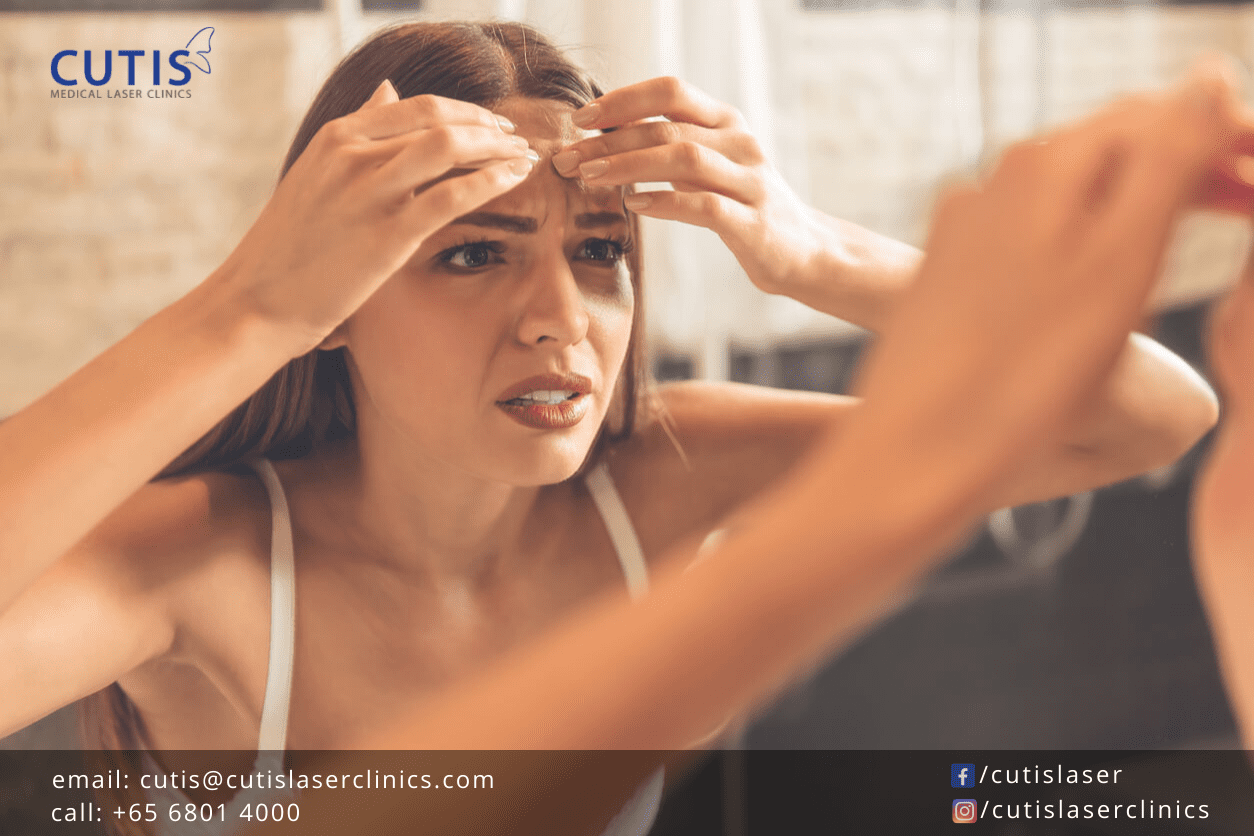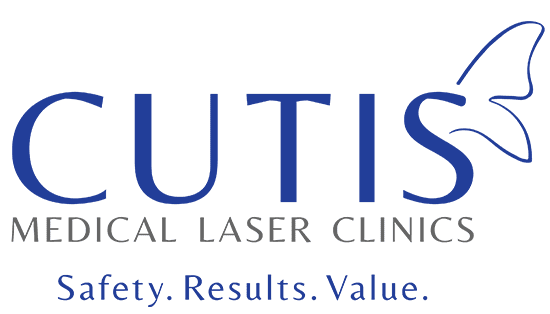
Skin issues can make you feel self-conscious about how you look. Women who just want to have clear and younger-looking skin can sometimes struggle with skin concerns that can affect their self-confidence and how they feel.
Continue reading as we explore the 5 common women’s skin concerns and how to address them.
1. Adult acne(Skin Concern)
Acne doesn’t stop after puberty ends; it can persist in adult years. And women, studies suggest, are more likely to be affected by adult acne than men. It can come in different forms and severity like blackhead and whiteheads (mild), papules and pustules (moderate), and painful cysts or nodules (severe).
Fluctuating hormones are the most common culprit, but other factors such as stress, pollution, and certain medications can also contribute to breakouts. Some health conditions that can alter hormones (like PCOS or polycystic ovarian syndrome) can also lead to acne or make your breakouts worse.
Check out the 5 things you need to know about adult acne.
What can help: Use a cleanser and moisturizer suitable for acne-prone skin. Topical skin products that can help with mild acne usually contain salicylic acid or benzoyl peroxide. If these don’t work, your dermatologist may prescribe retinoids, antibiotics, or hormonal therapies.
Certain aesthetic treatments can help improve breakouts or calm inflammation. At Cutis, we have an Anti-Acne Peel that can unclog pores and kill acne-causing bacteria. We also have the VI Peel Purify, which is a chemical peel formulated for treating acne and other issues caused by acne symptoms.
2. Dark spots or hyperpigmentation
Pigmentation appears as spots and patches that are darker than your natural complexion. These darkened spots also vary in size and usually occur in areas that are frequently exposed to the sun, including the face, neck, shoulder, and back of hands. There are different types of hyperpigmentation:
- Sun spots or age spots – small, dark patches due to sun exposure.
- Melasma – common in pregnant women and believed to be triggered by hormones.
- Post-inflammatory hyperpigmentation – can be due to injury or trauma (like acne) that heals and leaves marks or discoloration behind.
What can help: Skin lighteners can help, but be wary of those products that contain high levels of mercury. To be safe, it is best to see a skin or aesthetic doctor to know which product or prescription medications can fade or reduce your pigmentation.
You can also turn to laser and chemical peels to improve dark spots. At Cutis, we have several non-invasive treatments that can help you achieve healthier and brighter skin. These include:
- VI Peel Precision Plus – This chemical peel is specifically designed for dark spots and pigmentation. It can unclog pores, exfoliate the skin, and promote rapid cell turnover. It also helps restore the skin to its natural health
- Limelight Photo Facial – This delivers intense pulsed light (IPL) onto the skin to draw out brown spots. It may cause the spots to appear darker, but they will scab and fall off after 5 to 7 days. This reveals a brighter and healthier complexion.
- PicoCare Laser – It shatters pigments into microscopic particles using high peak laser power with shorter pulse durations. PicoCare can also stimulate new collagen, as well as improve skin tone and texture, and lift depressed acne scars.
- Pearl Procedure – This uses pulses of light that remove a portion of the damaged skin surface. It causes the skin to form a natural protective dressing, which will peel off after 3 to 5 days. This gives the skin a pearly-like glow.
- Meso-Peel – This combines Dermapen 4 and Über Peel, a professional peel designed to improve skin needling procedures. This can promote cellular turnover, while also addressing hyperpigmentation, signs of aging, milia, and acne.
3. Rosacea
This chronic inflammatory condition causes persistent redness or flushing in the face that can look like a sunburn. Rosacea commonly appears on the nose and cheeks, but it can also occur on the chin and forehead. It affects both genders, but is a lot more common in women, especially those with fair skin.
The exact cause of rosacea is not known, but several things can contribute to its development. Genes are one common factor, as rosacea tends to run in families. It can also be due to the presence of certain bacteria in the gut or skin mites on the skin, medications, an overactive immune system, or other environmental factors.
What can help: The common treatment for rosacea focuses on improving its signs and symptoms. It also depends on the type and severity of your condition, but often requires a combination of prescription drugs and a good skincare regimen. Avoiding triggers and using products for sensitive skin also help.
There is no permanent cure for rosacea, but seeing a professional can help you manage its progression. Some treatments like Laser Genesis Skin Therapy can be beneficial, as it stimulates the body’s healing response and boosts collagen. It can also reduce facial redness and treat a number of skin concerns.
4. Signs of aging
The body starts producing less collagen as you age. This can cause the skin to sag and become thinner, resulting in wrinkles, creases, and folds. And while it is natural for collagen production to slow with age, pollution, UV exposure, bad skin habits, and poor diet can speed it up.
The skin continues to lose more collagen as you go into perimenopause and menopause. In fact, studies suggest that in the first 5 years of menopause, collagen decreases by 30%. The loss of this essential skin protein can lead to:
- Fine lines and wrinkles
- Sagging skin/jowls
- Sun spots or age spots
- Eye bags
- Dry, rough, or crepey skin
What can help: Eating collagen-rich foods can help, as well as limiting (or quitting) sugar, which is known to destroy collagen and makes the skin inflexible. You should also quit smoking if you do, as this habit damages collagen and accelerates skin aging. You can also consider collagen supplements, but be sure to ask your doctor about them before taking one.
Certain aesthetic treatments can help stimulate collagen production and improve signs of aging. Some of the non-surgical procedures worth considering include:
- Ultherapy – a US FDA-cleared procedure that can tighten the skin on the face, brow, and under the chin. It uses time-tested focused ultrasound energy that goes into the skin’s foundation layer, stimulating collagen.
- Radiesse – an injectable filler made with CaHA or calcium hydroxylapatite microspheres. It can smooth away moderate to severe facial wrinkles and give the skin an immediate lifting and firming effect. Radiesse is also called a bio-stimulator, as it can stimulate the body to produce more of its own collagen.
- Microneedling – also referred to as collagen induction therapy. We use the Dermapen 4, which creates tiny superficial wounds in the skin. These assist in the healing process and stimulating collagen production.
5. Stretch marks(Skin Concern)
While both genders can develop stretch marks, it is a lot more common in women. They show up as long, indented marks that usually appear on the stomach, arms, breast, thighs, hips, and buttocks. Stretch marks are also of a different color than your skin and can be purple, dark brown, or silver (white).
These marks appear due to the pulling of the skin caused by rapid growth or stretching. They are often seen in a woman’s abdomen during pregnancy, but they may also occur during rapid growth in puberty. Sudden weight gain and loss, rapid muscle growth, and certain disorders can increase your likelihood of developing them.
What can help: No cream or lotion can eliminate stretch marks. Good quality moisturizer can help, particularly in relieving dryness and itchiness. Being patient also helps, as these marks fade and become less noticeable over time. Following pregnancy, reddish or purplish marks may turn to light pink.
Aesthetic treatments can also help reduce stretch marks. At Cutis, we have the Dermapen 4 microneedling, which punctures the skin’s top layer to facilitate rapid wound healing. It causes micro-trauma in the skin and helps stimulate collagen production. This can smooth acne scarring and stretch marks.
Book a consultation today
If you’re dealing with the skin problems (skin concerns)mentioned above, don’t hesitate to get in touch with us. Contact Cutis Medical Laser Clinics in Singapore today and schedule a consultation with our aesthetic doctor to find out which treatment suits you best.
- If you would like to be an informed patient, please contact us at +65-6801-4000 or
hello@cutislaserclinics.com. - Cutis Medical Laser Clinics, 9 Scotts Road Pacific Plaza, Scotts Medical Center #08-07, Singapore – 228210
+65-6801-4000 - hello@cutislaserclinics.com
